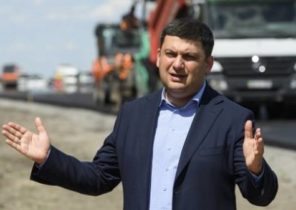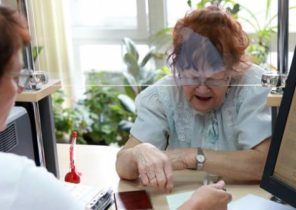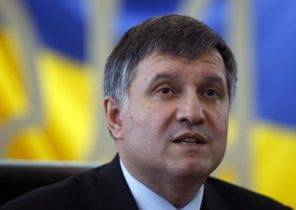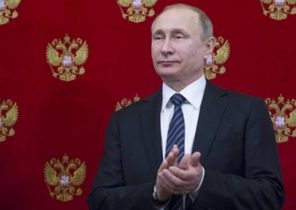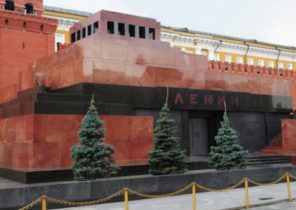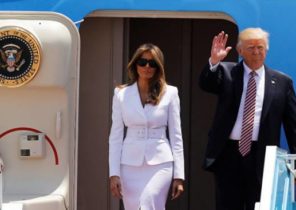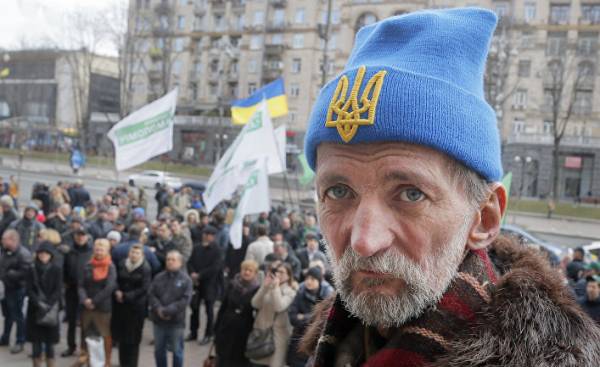
“The system of public administration complex, conserved and inert. Need specific solutions. I want to bring in the government structures a thousand new agents of change,” — said the compatriots on Twitter, Prime Minister of Ukraine Volodymyr Groisman. Since the approval by the Verkhovna Rada, his government was year. Recently, the Ukrainian branch of the Carnegie endowment has published a new edition Ukraine Reform Monitor, trying to answer the question, what seen more and more residents of Ukraine over the past year: loud political declarations or real reform?
The Augean stables of Ukrainian politics began to look somewhat more decent, although not clean — that is, if we try to formulate briefly the overall impression of the report’s authors. More than 50 cases of major corrupt officials brought to court. Especially a lot of fuss about the recent arrest of the head of tax Ministry of Ukraine Roman Nasirov; he was later released on bail of 100 million hryvnia.
Approved an important reform of the judicial system and the law on status of judges. Thorough cleansing of the police: a quarter of senior officers were dismissed as failing to meet the new requirements — though some of them were later restored to the work of the courts. Launched a four-year radical health care reform. Ukraine’s economy in 2016, stopped falling and even — for the first time in recent years — increased slightly. And the conflict with Pro-Russian separatists in the East of the country passed from the acute phase of a protracted, which in the current situation gives the authorities a chance to deal with domestic problems.
In addition, according to experts, President Petro Poroshenko failed to consolidate Executive power. Unlike its predecessor, Arseniy Yatsenyuk, the current Prime Minister Groysman — an ally, not a competitor Poroshenko, President of friendly people standing at the head of key ministries. On the one hand, as the authors of the report, it gives the authorities a free hand for reform — especially about the most important problems of the country, the government seemingly has an idea:
#5реформ: pencina reform, land reform, privatization neefectivni activw, medychne I osta reform Golovin of priorities.
— Volodymyr Groysman (@VGroysman) 20 APR 2017
“Five reforms: the pension, land, privatization of inefficient assets, health care reform and education.”
On the other hand, the recent history of Ukraine has developed in such a way that after each change of government confidence in the new leadership proved to be short lived. According to Ukrainian political analyst Vladimir Fesenko, the current situation — special: “the vast majority of Ukrainian citizens do not trust now neither the authorities nor the opposition. It will stabilize the current tense situation. But the question is — for how long?”
On this issue and prospects of Ukrainian reforms in an interview with Radio Liberty speculates co-editor of the report Ukraine Reform Monitor, who worked in Ukraine, researcher at the Carnegie endowment for international peace (Washington), the first Arabic.
Radio Liberty: Ukrainian economy grew last year by more than 2%. Can you talk about the beginning of the economic recovery?
The first Arabic: Macroeconomic stabilization is a fact, but none of this could happen without the assistance and guarantees from the international financial institutions, which act as a kind of financial protectors of Ukraine. Of course, this protection cannot be taken for granted. The IMF on the one hand requires the implementation of neo-liberal reforms, and on the other insists that the Ukrainian authorities take the most stringent measures against corruption. This stabilization should also be considered in a specific context: before that, in 2015, the Ukrainian economy fell by 15%. So the current success is very modest. Ukraine needs a much more rapid growth.
Negative phenomena are still missing: failed to privatize several important enterprises, the annual outflow of capital from Ukraine is 12-13 billion dollars, which is more than the amount of foreign direct investment in the country’s economy. The main foreign investor — Russia.
— It is often said that Ukraine and Russia if not officially, then in fact in a state of war — and the Russians actively invest in the Ukrainian economy. In which sectors?
In those industries to which they have access. It is primarily the banking sector. Not accidentally we were witnesses of the shares of the Ukrainian nationalists against Russian banks, whose withdrawal from the Ukraine they are making, is primarily a savings Bank. So if we talk about investment, the first place of Russia provided that the capital of this country is still present on the Ukrainian market, while other countries capital comes very little.
— The average monthly income in Ukraine is very low — according to recent reports, less than $ 200 is even less than in many other former Soviet republics, not to mention the EU. Your report, with all possible “but” designed in a rather optimistic spirit. Do you think that ordinary Ukrainians have felt over the past year some changes for the better?
We tried to sum up above all that Ukraine has managed to make part of the reforms. In General you are right — the socio-economic conditions remain difficult for the majority of the population. Affected and the price of those neo-liberal reforms demanded by the IMF sharply increased electricity tariffs, gas that is very difficult for citizens. They certainly do not see the situation in shades of pink. I think this year it will be the main question for the Ukrainian authorities: will the reforms to bear fruit for the ordinary citizens of the country, feel do ordinary people any improvement. If not, the current government a lot of trouble. And in General it will be difficult to hold that a political consolidation, which became an important feature of the last years in Ukraine. It happens despite the war in the East of the country, despite the many salient political issues. But without improving the socio-economic situation, this consolidation is unlikely to continue.
— If I understand correctly, you are talking about a consolidation of power in the first place the power of the President Poroshenko and the Ukrainian government. Do you consider it a positive factor?
— I think this is a factor that contributes to handling. From the point of view of the quality of democracy is not necessarily a positive thing. President Poroshenko is now in control of the Executive branch, including law enforcement agencies, has a noticeable influence on the judicial system. This is a serious concentration of power in the same hands that Ukraine is a unique phenomenon. It is a confusing thing, but to carry out the necessary reforms of the judicial system, privatization and so on — without the political will is impossible.
— Poroshenko, as you know, promised a “historic event” of Ukraine. How he manages to fulfill that promise? The nationalization belonging to the oligarch Igor Kolomoisky “PrivatBank” is a step in this direction?
— Political consolidation, which was achieved by President Poroshenko, accompanied by and business consolidation in its own interest, he’s also a big businessman-oligarch. I see this as a very big weak spot of his reign and the whole process of Ukrainian reforms. Then there is a “historic event” comes at the expense of other oligarchs, but in favor of the business interests of the oligarch-President. Kolomoisky is also not so simple. According to estimates, the nationalization of the Bank cost the state about five billion dollars. However, many analysts argue that Kolomoisky or gained access to most of these money and ordered them differently, or even earlier devastated “PrivatBank”in such a way that the state simply had no other exit, except for its nationalization, otherwise we would have suffered a huge number of customers of the Bank (he Kolomoisky is believed to have been a “victim of abuse” of the National Bank and the Ukrainian authorities — approx. Radio Liberty). All these things become a political issue: political consolidation, which I mentioned, cannot be legitimate in the eyes of the citizens, while if they see leading politicians to protect primarily their commercial interests.
Whether Poroshenko and other Ukrainian politicians reform as such? Elections are approaching, the current Ukrainian President will probably try to get re-elected for a second term. In these circumstances, if he and his government take the risk, because reform is always a risk, it is always painful?
— Reforms are slow. On the other hand, Ukraine has many problems, even apart from internal problems, factoring out the conflict with Russia — that I personally had expected the pace of reforms will be even slower. So, from my point of view, everything is not so bad. However, in the West, expectations were much greater. Just because of the war in the Donbass there believed that Kiev will be much more reformist fervor and political will. Many Western politicians and analysts simply didn’t understand the Ukrainian politics is very colorful, that there is all the time a fight between different interest groups, so it is very difficult to have a unified political will. Too much energy spent on “intraspecific fighting” the political and oligarchic clans. Now, as I said, we have a situation when this a single will seems to be there. But the clans did not disappear, and civil society, which we in the West are accustomed to — and rightly so — to actively support, is still not enough to achieve a rapid reconstruction of the entire political system, which is already 25 years old. Now Ukrainians, including in connection with the upcoming elections, which you mentioned — will have to answer for themselves the question: do they have the will and desire to convert this system to carry out reforms regardless of who is President or head of government.
Factor of the war in the East of Ukraine if it is impossible to get around. Recently Oleksandr Turchynov, Secretary of the national security Council and defense of Ukraine, stated that Russia is preparing for “full-scale war against Ukraine and other countries of Eastern Europe.” That is a real forecast or purely a political statement?
— Think second. From the mouth Turchinov such statements have already been made, I think, 10-15 times. Convincing signs that Russia is preparing full-scale invasion, no. There is another: the desire of many Ukrainian politicians to write off their mistakes, laziness, inertia on the machinations of Russia. The reason for this Moscow gave them: of course, the annexation of Crimea and intervention in Donbass is a reality.
The reality is that the Minsk agreement is not respected by all parties. Moscow, based on their interests, wants between the Kiev authorities and separatist entities in Eastern Ukraine started a political process. Kiev, by contrast, does not want it, the majority of parties in Parliament, and the majority of society, such negotiations would be treason. Hence the statement that Russia is preparing a large invasion. Everyone is talking about commitment to the Minsk agreement, but nobody does anything to implement them. The Ukrainian side referred to the fact that in the Donbass shoot — that’s true, although it is not full-scale battles, but regular mutual fire victims. At the same time, this is a purely local collision, we are talking about four or five points on the contact line with a length of several hundred kilometers. But politically it is profitable — you can always say that first we must agree on security, and then to resolve political issues.
— To quote a recent article by one Ukrainian analyst: “Every failure of the state machine, every corruption scandal, every slap in the face to Patriotic citizens are accompanied by mantras, reminders about the Kremlin menace and nuisance calls not to rock the boat. Meanwhile, this tactic only increases the risk of destabilization.” Can it happen that the Ukrainians again impatient, in 2004 and 2013, and they again take to the streets?
— It is impossible to exclude anything. But I would still stressed that the new Ukrainian patriotism is a real and big thing. It is felt everywhere, and in personal conversations with people, and, according to the survey, at the elite level, local, regional and national. My impression is that the majority of Ukrainian society still believes that the price it pays for deterring Russian aggression, is not too high. But once again: Ukraine is now a very important point. If the reforms do not bring results, visible to all citizens, and this Patriotic wave may not be enough for long. Some references to the aggression of Russia and the impending invasion of the enemy’s power will not last indefinitely. Need to work on implementation of the social contract, to build a working control system, and the oligarchs — to change the attitude towards their own country. If they stop pumping their money abroad and start a large-scale to invest in the Ukrainian economy — this will be the first sign that things in the country really has changed.
— What about the rest of the world, especially the West? It seems that he is about Ukraine forgot a few. In any case, it is no longer the center of attention a couple of years ago.
Yes. But it’s something good. Media and politicians are primarily interested in sharp conflict. Time less said about Ukraine, including about the war in the Donbas, means that the conflict came from the acute phase, but life was closer to normal. But this means at the same time that the success of Ukrainian reforms is modest because various “economic miracles” also attract attention. I would be happy if there were grounds to speak about Ukraine more in this sense — as an example of success.
— Dream of integration into the Europe of the EU, which began Euromaidan — this is for Ukraine only a dream or still a real prospect, albeit distant?
— This is still a very popular idea at the polls, want it about 60% of Ukrainians. I think that most of these people are well aware that this sprinting. And that no help from the EU without reform efforts of Ukraine itself to anything will not lead. But there is another side of the issue: the EU itself is now in need of reform, without which it is difficult to talk about some further expansion and admission of new members, including Ukraine.
